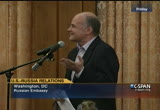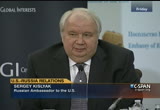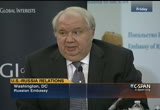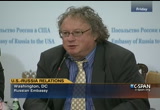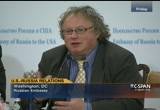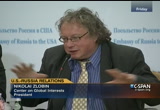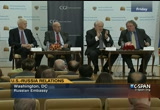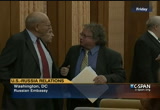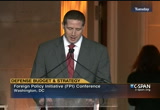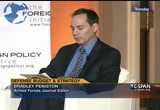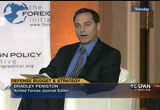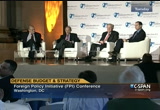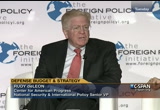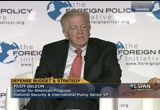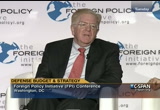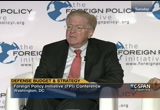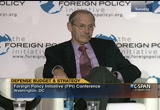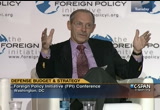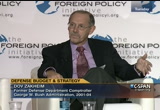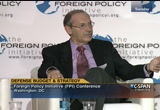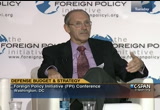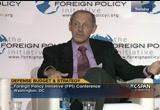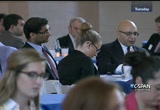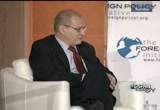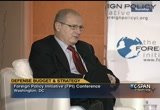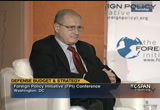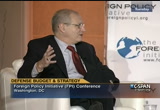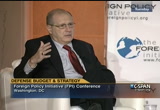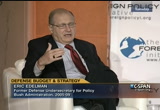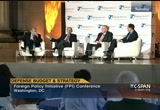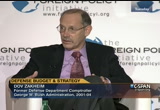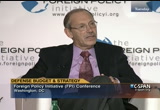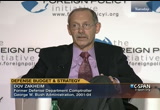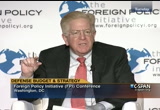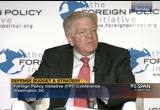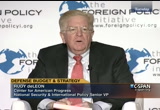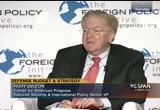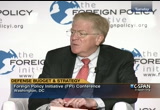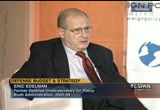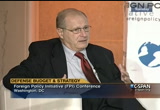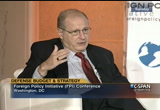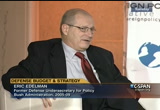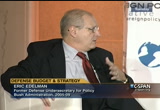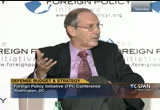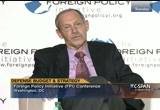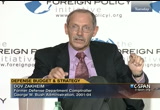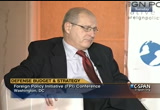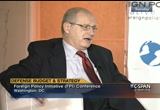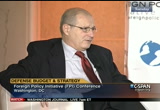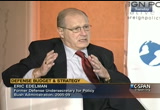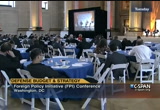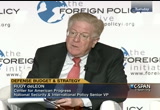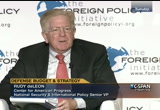tv Panel Discussion on Defense Budget CSPAN October 28, 2013 2:25am-3:21am EDT
2:25 am
center, they will say, why are you here? no one called us. what should i do and what should -- kind ofrms of like a guidance. [indiscernible] >> you know, it is changes. be well planned and organized. i have seen a number of programs during my years here. some of them were very successful. others less so. first and foremost, we have to parties on both sides that ,re interested in this exchange
2:26 am
that understand what is it they want to focus on. whether they agree as to the most important things people -- then, ad to see number of organizational things. how to get money to finance it is one of the most difficult issues. how to best organize it to see what they want. there is a lot of organizational work. you need to find partners in russia, belarus, anywhere that share your interest. recipe that is the best as of today. >> thank you.
2:27 am
22 years after the breakup of the soviet union, we have a very different global world. it is very different than it used to be during cold war. relations are quite different. diplomacy is quite different. capabilities are very different. and the level of danger is quite different. they often don't understand it. one of the biggest problems in u.s.-russia relations is a lack of fresh ideas. lack of breakthrough ideas. kind of intellectual dead-end. we have great experts on u.s.- russia relations and one of the conclusions from today is, these too can get rid of cold war mentalities.
2:28 am
that is a very depressing conclusion after 20 years of trying to shape u.s.-russia relations. that is extremely important for u.s. and russia to be strategic allies. if not friends, at least allies. not to count endlessly warheads. it is kind of insulting for both countries not to trust each other. think we have to do something drastic toectually change the way u.s.-russia relations develop. dramaise, we bring this to make us interested.
2:29 am
this is a task for the next generation and for us of course. i think we learned a lot today. great experts who really keep u.s.-russia relations and very decent shape. i hope people like our three speakers -- for some reason there is in russia and america at leaste is a demand in public opinion. people expect bad things. we have to fight this. much more open about little success. not high level, but on a grassroots level. maybe we don't need a big vision for cooperation on that level but this will build up.
2:30 am
i think we start this conversation now. we need a new strategic vision. it is not about today and tomorrow. years.bout 25 what the danger -- where are we going to be? for young people it is extremely important. you are going to take over american foreign policy. you have to think about that. to follow theu three great experts. i hope you will do it more regularly. i am really grateful to three ambassadors coming here and sharing their view with you guys. i learned a lot today. i hope you too. thank you very much. [applause]
2:31 am
2:32 am
2:33 am
followed by a discussion on the government's efforts to fix the health care law's website. then, the earned income tax credit. how it works and who is eligible for refunds. journal live every morning at 7:00 a.m. eastern on c-span. monday on the c-span networks, the mortgage bankers association will hold its annual convention in washington dc focusing on the future of the housing market. donovan, include shaun richard cordray and edward demarco among others. the jack kemp foundation will honor former florida governor jeb bush with its annual
2:34 am
leadership award. past recipients include paul ryan and fluorescent -- florida senator marco rubio. the event will take place in washington dc with john boehner and tim scott. at 7:30erage begins p.m. eastern on c-span 3. >> there is over 100 wireless carriers in the united states. we represent from sprint, t- mobile all the way down to the smallest careers of the united states. it may not be your normal household names but in the area that they serve, they are important to the community. they are community-based and small businesses. we have 100 carriers. some outside the united states. we also service almost 200 associate members. that is small businesses that make up the ecosystem that supports wireless carriers. >> the future of small wireless carriers monday night on the
2:35 am
communicators at 8:00 p.m. eastern on c-span 2. former officials with the pentagon talked about the effect of budget cuts on the role of the was military in the world. this is part of a conference hosted by the foreign policy initiative. it is about an hour. >> there should be a natural continuation of the themes that were highlighted in the last conversation. we are joined by people who serve on the board of directors. a conversation about how to sustain and strengthen america's defense capabilities. i thank the gentleman who will introduce and moderate our speakers. brad is the editor of armed forces journal. it has been published since 1863. congratulations to them. he has written extensively about the u.s. navy.
2:36 am
bradley if you will? >> well, we live in interesting times. we have left iraq. we are drawing down in afghanistan. we are still pursuing al qaeda and similar groups. syria is burning. china is rising. it has not settled whether it is rival or partner. climate change is altering the world. globalization has entwined as productively and made us more brittle. our communications web allows the spread of violent ideas and unimaginable speed. the general who runs the development center put it this way. the momentum of human interaction is increasing exponentially. the security environment is changing. our military services which have
2:37 am
spent much of the past decade relearning the lessons of counterinsurgency and expanding upon them are trying to figure out what they should be 5, 10, 20 years from now. the strategy side is just half of it. after a decade in which military funds were all but limitless, budgets are down again. there has been a buildup in which we did not recapitalize our arsenal. the u.s. has emerged from a decade of war with fewer aircraft, fewer ships, thousands of combat vehicles now abandoned in foreign lands. instead of getting larger, our military has become smaller, older and more expensive. no longer can the military do it all. advancing our national ambitions with our defense budget requires serious prioritization or perhaps innovation. do we sacrifice near-term capacity to build long-term capability? do we rely on allies and partners to a degree once
2:38 am
thought unimaginable? during his last few months in office, robert gates who led the way in making the first round of cuts was known to say, tell me what we are not going to do anymore. what defense do we need? what defense can we afford? we want a strategy-driven, resource-informed solution. there is another twist to this. a budget process has gone from cumbersome to counterproductive to slightly insane. we will talk about that a little bit later on. you could not ask for a better panel to help us figure this all out. the gentleman to my right needs no introduction and yet i am a slave to orthodoxy so i will offer one.
2:39 am
rudy deleon, his term as deputy secretary of defense under bill clinton capped a quarter-century of government service that included posts such as under secretary of the air force. before that he was on congressional staff holding various positions including staff director for the house armed services committee. after leaving government service, he ran boeing's office for several years. currently he is senior vice president for national security at the center for american progress here in washington. he will speak for five minutes. >> thank you for the invitation. i thank the sponsors for the chance to come here and participate. this is a very important discussion in terms of how to be thinking about the defense budget, how to look ahead. we are in one of those times where we need to recalibrate. a period dominated by iraq and
2:40 am
afghanistan is coming to an end. we still have combat troops in afghanistan. their exit in 2014 is something that we have to have a focus on. moving beyond that, we have got the asia-pacific at the center of global commerce, the center of the recovery from the economic slowdown. a series of unusual economic alliances. yet, the military alliances and strategically, the security of asia still revolve around the united states. we have a middle east that is as complicated as ever. including a civil war in syria. preliminary diplomacy in dealing with iran but unease among gulf neighbors.
2:41 am
the perennial question of the west bank and the palestinians and their status. all of those issues, as critical as they are were in the middle of the most complicated and chaotic budget process that i think our national security has seen since the end of world war ii. that is a huge period with lots of -- dod is the most sophisticated of the government agencies. it works also something called the future years defense budget. 5, 6 years in the making long- range decisions that the secretaries look at. they were able to do it in a strategic environment and set the direction for budget alterations and execute them across a decade.
2:42 am
now, we have gone from the period of the five-year defense plan to continuing resolutions which were for a while six months. now there are four months in duration. add to that the sequester which is the product of the debt ceiling compromise two years ago. to quote leon panetta as he was the parting as secretary of defense, he said we can no longer go from budget crisis to budget crisis. he said this is not a game. that coming from a secretary of defense who had unique skills, but perhaps our shrewdest budget expert in the government. figuring out a path forward in terms of how to create budget stability -- one last comment, if we look at the sequester, that is $1 trillion worth of cuts off of 10 years. the president has put an
2:43 am
alternative number down that is a little bit more than $500 billion over 10 years. there is a huge gap between how congress sees the future defense budget and how the president does. in terms of the magnitude. a very dynamic and challenging time. the rest of the world will not stop. >> another man who needs no introduction but i will deliver one anyway. he is a former pentagon comptroller. among his other posts have been deputy undersecretary of planning and resources. from 2002 to 2004, he worked in afghanistan. earlier, he was a defense and foreign policy analyst. after leaving government service, he became senior vice president of booz allen hamilton
2:44 am
today he is a senior fellow, senior adviser. he chairs the national intelligence council. he is a member of the commission on wartime contracting afghanistan. i think you get the idea. without further ado. >> thanks very much, brad. full disclosure, eric edelman and i co-authored an op-ed not long ago. rudy and i have been on radio a while back. what you're going to hear, you're going to hear shades of difference, but for the last 60 years there has been a fundamental consensus about the united states strategy which is forward. it involves across the board deterrence. it involves relatively stable budget.
2:45 am
there is so much uncertainty now. because there is, we tend to be overly pessimistic. there is always going to be uncertainty about where we fight. other than world war ii, korea was unpredictable, one could argue about vietnam. we got into it far more than we thought. just about every war we have fought, they were not things we expected to fight. we can't be certain about what kinds of tools we are going to use. you have to be very careful about what you throw out of the toolbox. we have become certain in a different way about what some people call multipolarity. they keep talking about the
2:46 am
brics, the chinese, the russians, the indians, the brazilians and maybe the south africans. every one of those countries is having economic problems now. there is no indication that there are going to get out of those problems anytime soon. their gdp's have leveled off. their populations arrested. that kind of prediction, that somehow the united states will be less powerful because others are becoming more powerful, i am not sure it holds water. to the contrary, this goes to some of the budget concerns we have got. i don't believe the issue is dealing with a ten-year sequester. i don't think anybody believes that. one of the reasons that i don't is because within five years, we are supposedly going to have a different energy profile.
2:47 am
that means there is going to be a lot more in the way of taxes coming into the government. a lot more revenue. therefore, when we think about defense, we have to be careful not to cut those things that will be impossible to replenish was the money starts coming in again. i am not sure we focus sufficiently on that. right now, all the talk is about, we don't want to fight another land war. guess what, mcarthur said that. we said that after vietnam. bob gates has said it. we don't know if we are not going to fight another land war. nobody knows. we don't know where we are going to fight next. how far you cut back on that is a very open question in my mind. we say, we can rely on special operations and cyber, and space. that is all true. to what extent do we rely? do we need other things?
2:48 am
whether we worry about china or iran or any other places, we seem to constantly call upon the carriers and the carrier task forces to do the job for us. is this the right time to be cutting carriers or cutting the navy or cutting the air force which is trying to some extent to work with the navy on these things? we have got to think differently about what we plan to do today and what we are planning for. i believe what we ought to be doing is thinking about how to get from here to there over the next few years until the money starts to come in again. not because there will be another war but because there will simply be more money there. we have to be very careful not to cut our noses off to spite our faces. that means thinking about efficiencies but not necessarily
2:49 am
about things we want to cut. i will give you one final example. i have seen many analysts say we ought to stop spending money on what we used to call national missile defense. we should stop -- it hasn't done anything for us. yet this very administration which is full of people who have written and said that for decades, as soon as north korea threatened to hit the united states, whether they could do it or not, they decided they wanted to buy more of these missiles. that is my point. once you get rid of something, it is very hard to get it back. let's be awfully cautious. >> for this to my right, ambassador eric edelman. his wide range of jobs has taken
2:50 am
him from the ambassadorship of finland and turkey all the way back to the wild of the pentagon and white house. he was undersecretary of defense for the bush administration. eric retired from foreign service in 2009. he is a distinguished fellow at the center for strategic and budgetary assessment. you get the idea. eric, please. >> thank you very much. as a member of the board, let me say how pleased i am to be on a panel with two great public servants, rudy deleon and dov zakheim, both of whom i have had the pleasure of working with in the past. the title of our panel -- i agree of course with most of what has been said before me.
2:51 am
i certainly hope dov is right that we are not dealing with a 10 year sequester. i don't think we should necessarily plan on that. let me start by saying, the title of the panel was, what kind of defense does the united states need? brad added, what kind of defense can we afford? let me make a couple of comments about both. rudy and i three years ago served together, the congressionally created independent panel to review the department of defense's 2010 defense review. the panel we served on was made up of 20 members. it was bipartisan. it was cochaired by bill perry and steve hadley. it articulated their set of
2:52 am
things -- it thought the united states had done and continued to do. among those were defending the homeland, maintaining the freedom of the seas, freedom of transit in air, outer space, freedom to use cyberspace. maintaining a balance of power in europe and in asia through our alliances as rudy mentioned in his comments and dov did as well. and being able to provide international humanitarian aid when disaster strikes as we have done repeatedly. i would say those are still things that the united states needs to be able to do. it is something that we have
2:53 am
done for the last 60 years. we have provided global public goods. i think what the events of the last month and a half -- i would conclude that include both the budgetary issues and the debate over syria, they have begun to call that into question. they call into question whether the united states is willing to continue to provide these global public goods. in 1962 president kennedy gave an interview to bill lawrence on abc news after the cuban missile crisis. in that interview, he talked about the fatigue after 17 years of national exertion since the end of world war ii that americans felt at having had to provide global leadership. now we are 60 years on.
2:54 am
clearly we are going to have to have that national debate now. the traditional coalition on the hill that existed when rudy was the staff director working for the chairman -- it doesn't exist anymore. most of the blue dogs have been defeated. they are not in the congress anymore. the republican conference is now deeply divided. between those who continue to bleed in the strong international role for the u.s. and those who believe that defense spending is no different than any other category in the budget and it is useful for negotiations over cutting discretionary spending or entitlement spending. i think we really need to have a debate.
2:55 am
we have lived in a period where we take it for granted that the u.s. will play this role, that it will have these kinds of treaty alliances. when you look back at our history, if bob were here, he would point out that it is the exception and not the rule. those of us who have been used to accepting this, the consensus position has gotten a little bit lazy about having to make the case for it. i think we need to remedy that and make the case for why we are providing public goods is vital to the nation's security and its future asperity and to that safety of the world in which we live. >> thank you. each of you has mentioned the
2:56 am
impact of the current budget situation and the danger it presents to the ability of the u.s. to carry out its foreign policy. it is also striking that we have heard various ways -- it is difficult to reconstitute what was once lost. there is a problem. it looks like we will not be able to do all of that. how do we get from here to there? how do we get to where we are to where we want to be? do you want to take that up? >> sure. i want to reiterate that i have a piece that -- the tea party,
2:57 am
what those folks do not seem to understand -- and it is not isolation. it is ignorance. america's economic security really depends on stability. stability depends on that u.s.'s ability to maintain its military capabilities. that has been the underpinning of international stability. these quarterly reports as it were where every quarter or every four months, you have no idea where the united states will be, it leads people to ask what i have been asked by foreigners from every part of the world -- are you guys crazy? that is not the way to promote stability. to answer your question directly, as long as we have got
2:58 am
this madness going on, let's say the sequester ends tomorrow. you still have the cuts. not trivial money. clearly the has to be some things done that has not been done. when eric says we have to take things seriously, he is right. the pentagon is not managed well. there are efforts to manage it well. we have all done our best to manage it well, but the bottom line is that it is not managed well. we have too many civil servants and to many contractors. we have an acquisition that is so bad we have set up a new rapid acquisition system to get around our own acquisition system. there is something wrong with that picture. we have defense agencies that are fortune 500 companies that are managed by gs-14's. can you imagine a gs-14 running
2:59 am
exxon mobil? or amazon? or frankly, any of the nfl teams except the redskins? [laughter] we have to rethink how we manage budgets. let's face it, even with cuts, we talk about budgets in access of $400 billion a year. that is a lot of money. it has to be spent well. we have too many facilities. congress has to do something about brack. we clearly have to get our arms around health care. $49 billion a year for this year for health care. the actuaries say we can save billions right now. there are things we can do.
3:00 am
83 Views
IN COLLECTIONS
CSPAN Television Archive
Television Archive  Television Archive News Search Service
Television Archive News Search Service 
Uploaded by TV Archive on

 Live Music Archive
Live Music Archive Librivox Free Audio
Librivox Free Audio Metropolitan Museum
Metropolitan Museum Cleveland Museum of Art
Cleveland Museum of Art Internet Arcade
Internet Arcade Console Living Room
Console Living Room Books to Borrow
Books to Borrow Open Library
Open Library TV News
TV News Understanding 9/11
Understanding 9/11